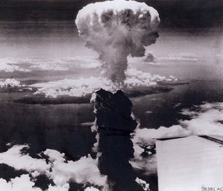CONSEQUENCES OF THE FIRST ATOMIC BOMB TEST, JULY 16, 1945
Harry Targ
The last wartime conference was held at Potsdam in July,
1945. While minor agreements were reached on the administration of Germany, the
meeting -attended by Churchill (and his replacement, Clement Attlee, who had
just defeated Churchill in British elections), Stalin, and Truman was filled
with acrimony. By the outset of the conference, Truman had heard of the
successful test of the atomic bomb. He realized that economic pressure on the
Soviets could then be coupled with the implied threat of using the most
destructive weapon the world had ever seen.
Truman, Attlee, and Chiang Kai-shek issued a proclamation
during the conference calling for the unconditional surrender of the Japanese.
This public statement was made without the prior knowledge of the Soviets.
During the weeks preceding Potsdam, the Japanese had been negotiating with the
Soviets over surrender. They only wished to preserve the Emperor as their
spiritual leader. It was clear, however, that the United States no longer
needed or wanted the Soviet Union to intervene in the Asian war or aid in
securing Japan's surrender now that the atomic bomb was operational.
On the German question the allies agreed at Potsdam to take
reparations from their own zones. The Western zones would give the Soviets ten
percent of their reparations because the Western zones included the industrial
sectors of Germany. Also, fifteen percent of Western reparations taken were to
be exchanged for agricultural products from the Soviet sector. These
agreements were soon to be dishonored.
Despite the communiqués between the Japanese and the
Soviets about possible surrender, the United States dropped an atomic bomb on
Hiroshima on August 6, 1945, killing 80,000 people. The Soviet Union sent their
armies into Manchuria on August 8, 1945 and on August 9 a second atomic
bomb was dropped on Nagasaki, leveling the city. The United States had become
the first power in world history to use nuclear weapons.
The Cold
War Heats Up
In October, 1944, Stalin and Churchill had reached an
agreement whereby the Soviet Union would have dominant influence in
Romania and Bulgaria after the war, and the British would have dominant
influence in Greece. Both nations were to have equal influence in Yugoslavia
and Hungary. While this arrangement was made without formal approval of
President Roosevelt, many analysts argue that Stalin assiduously honored the
arrangement after World War Il, until the Western nations began to
pressure Stalin to reduce Soviet influence in Eastern Europe.
This pressure began almost immediately after the United
States dropped the atomic bomb in the summer of 1945. The U.S. secretary of
state, James Byrnes, publicly attacked the Soviets for a lack of democracy in
the Bulgarian election, which was subsequently postponed until 1946. While the
Soviets did influence Bulgarian politics, in what had been a country allied
with Germany, at the same time they did not engage in political pressure in
support of the left in Greece, Hungary, or Yugoslavia. Consequently, the public
attack on the Soviets was probably seen by them as a repudiation of the
Churchill-Stalin agreement of 1944. Further, as Horowitz suggests:
The deeper significance of Byrnes' statement was that it
indicated to the Russians that the West was no longer interested in working
with them, and indeed was ready to use its preponderant power to prevent
the Soviet Union from organizing a sphere of influence (in accord with previous
agreements) in the vital East and Central European area. Thus, on the very
day the second atomic bomb was dropped on Nagasaki, and while Washington
was staking out its own sphere of influence in the Pacific, President
Truman declared that the East European countries were "not to
be spheres of influence of any one power." This was the effective end
of the coalition (David Horowitz, The Free World
Colossus, 1971, 57).


